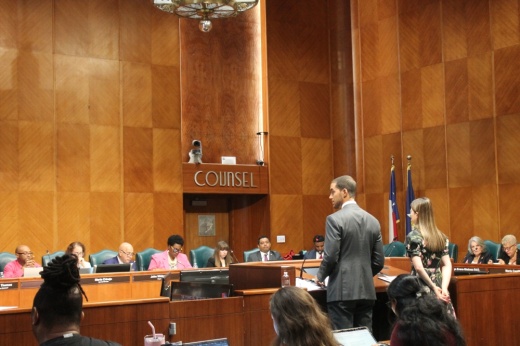“I look at it as the public gains $53 million,” Whitmire said at the Oct. 8 City Council meeting. “With the cost of living and affordability being on everyone’s mind, the public just does not want to pay more fees or taxes.”
At a glance
City Council set the proposed rate of $0.5191 per $100 home valuation, which is lower than the rate used to calculate the FY 2025-26 city budget that the council adopted in June. The proposed rate is the same as the last two years.
City Finance Director Melissa Dubowski said the budget was created using a rate of $0.5378 per $100 home valuation, which is the maximum rate the city could adopt without voter approval due to local revenue cap laws. The city would see an estimated $53 million decrease in revenue if the council adopts the proposed lower rate later this month.
According to an Oct. 7 presentation to the Budget and Fiscal Affairs Committee, the city has decreased its property tax rate nine out of the last 11 years. Dubowski said during the BFA meeting the decreased rates reflect high taxable valuation growth in Houston over the years.
However, she said the city has seen a recent decrease in taxable valuation growth due to restrictions from the Texas Legislature.
What they’re saying
Several council members voiced concerns during the discussion about adopting a rate lower than what was used to budget for FY 2025-26. Council member Edward Pollard asked Whitmire why he supported the budget as proposed if he did not intend to raise property taxes.
In response, Whitmire said the city has since received different appraisal values than were used to draft the budget.
“We did what we thought was prudent and responsible in June,” Whitmire said.
Council member Abbie Kamin suggested the city adjust its budget adoption calendar so the council can work with the most up-to-date valuations.
Council member Sallie Alcorn said she has no doubt the city will balance its budget, but she’s concerned about the sustainability of funding the operations of general fund-supported departments.
“It’s just math,” she said. “When we get five-year forecasts ... and our baseline forecast says we’re going to have a $227 million deficit in [FY 2026-27], I have to pay attention to that.”
In a report to City Council, City Controller Chris Hollins said keeping the tax rate the same means the city will generate substantially less revenue than it needs to meet the FY 2025-26 budget. He said the city will create a “self-inflicted” $53 million shortfall on top of more than $70 million in deficit spending.
“To cover that gap, we’ll have to draw down our reserves even further, the same reserve we depend on during hurricanes, freezes and economic shocks,” Hollins said.
A quick note
The city calculates its property tax cap each year based on three different laws, Dubowski said during the Oct. 7 BFA meeting. The city’s cap is in part determined by revenues from the previous year, according to Dubowski’s presentation. She said the city has to calculate its annual cap based on each of the three laws and comply with the lowest calculation.
A one-penny increase to Houston’s property tax rate would impact the average homeowner by about $2.85 per month and generate approximately $28 million in additional revenue for the city, Dubowski said.
Stay tuned
City Council voted unanimously Oct. 8 to place the proposed property tax rate of $0.5191 per $100 home valuation on the Oct. 15 agenda.
Council will hold a public hearing for the proposed rate during its Oct. 15 meeting at 9 a.m., with council members expected to vote on the tax rate later in the meeting.





